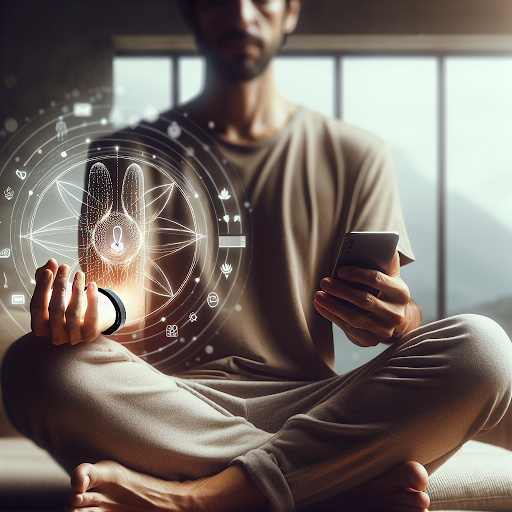Can a Meditation App Lower Your Blood Pressure?
Your Phone Might Be the Most Powerful Medicine You're Not Using
Picture this: You're sitting in traffic, blood pressure rising, stress hormones coursing through your veins. Your phone buzzes with another work email. But what if that same device causing your stress could actually be rewiring your body at the genetic level to make you healthier?
It sounds like science fiction, but it's happening right now in pockets and purses around the world.
The 10-Minute Revolution
When psychologist J. David Creswell at Carnegie Mellon University set out to study meditation apps, he discovered something remarkable. People who spent just 10 to 21 minutes meditating with an app three times a week weren't just feeling better—their bodies were fundamentally changing. Their stress levels dropped. Their sleep improved. And most surprisingly, the very genes responsible for inflammation in their bodies started behaving differently.
Think about that for a moment. Three short sessions a week—less time than you spend scrolling social media during lunch—and your DNA expression actually shifts.
Beyond the "Om": The Hard Science of Soft Skills
For years, meditation lived in the realm of wellness blogs and yoga studios. But now, with millions of users generating data through wearables like Apple Watches and Fitbits, scientists can study mindfulness at an unprecedented scale. And what they're finding is reshaping our understanding of health.
Take blood pressure, for instance. Researchers studying breathing awareness meditation (BAM) through apps found that pre-hypertensive adults could significantly lower their systolic blood pressure with regular practice. The sweet spot? Five to fifteen minutes, twice daily. It's like having a blood pressure medication in your pocket, minus the side effects and prescription refills.
But here's where it gets truly fascinating.
Rewriting Your Genetic Story
A groundbreaking Harvard study followed people using meditation apps daily for eight weeks. The results? A staggering 172 genes changed their expression patterns—specifically those involved in inflammation and metabolism. These weren't just any genes; they were the troublemakers linked to heart disease, diabetes, and chronic pain.
Imagine your genes as a massive orchestra. Stress conducts them to play a harsh, inflammatory symphony. But regular meditation through these apps? It's like bringing in a new conductor who transforms that chaos into something harmonious. Your blood pressure drops. Your inflammation markers decrease. Your entire biological system shifts toward healing.
The Loneliness Antidote in Your Pocket
Beyond the physical benefits, these digital mindfulness tools are addressing one of our era's most pressing health crises: loneliness. Research shows that meditation app users experience reduced psychological distress not just through stress reduction, but by increasing mindful awareness and compassion.
In a world where we're more connected yet lonelier than ever, these apps are teaching us to reconnect—not through another social network, but through the ancient network of human consciousness and compassion.
The Adherence Challenge: When More Isn't Always Better
Here's the plot twist: researchers discovered that while longer meditation sessions (15-20 minutes) produced better results, they also led to higher dropout rates. It's the exercise bike phenomenon all over again—we start with grand ambitions, then life gets in the way.
The most successful app users? Those who found their personal sweet spot—usually around 10 minutes—and stuck with it. Consistency trumped intensity every time.
Your Health, Democratized
What makes this revolution particularly powerful is its accessibility. You don't need a guru, an expensive retreat, or even a meditation cushion. Whether you're a CEO in Manhattan or a teacher in rural Montana, if you have a smartphone, you have access to the same tools that are literally changing people's biology.
This isn't just about individual health—it's about public health. We're witnessing the democratization of a practice once reserved for monasteries and wellness centers, now available to anyone with a phone and a few spare minutes.
The Future in Your Hand
As our devices become more sophisticated—tracking heart rate variability, sleep patterns, and stress levels in real-time—meditation apps are evolving from simple guided sessions to personalized health interventions. They're learning when you're most stressed, suggesting breathing exercises before important meetings, and adjusting difficulty based on your progress.
We're standing at the intersection of ancient wisdom and cutting-edge technology, where a 2,500-year-old practice meets 21st-century innovation. And the early results suggest this marriage might be one of the most powerful health interventions of our time.
So, What's Stopping You?
The science is clear. The tools are free or affordable. The time commitment is less than your coffee run. Yet most of us still treat our meditation apps like that gym membership we bought in January—good intentions gathering digital dust.
Here's my challenge to you: For the next week, commit to just 10 minutes a day. Set a reminder. Treat it like a meeting with your future, healthier self. Because in a world where chronic stress is literally killing us, we finally have a scientifically-proven antidote that fits in our pocket.
The question isn't whether meditation apps work—the science has answered that. The question is: Will you give your genes a chance to tell a different story?
What's been your experience with meditation apps? Have you noticed any physical or mental changes? Drop a comment below and let's start a conversation about making mindfulness as routine as checking our messages.




